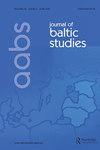未知的战争:立陶宛的反苏武装抵抗及其遗产
IF 0.5
4区 社会学
Q2 AREA STUDIES
引用次数: 0
摘要
只有少数几个标题很难反映当前学术界对这些问题的理解。一些解释没有任何参考文献支持,进一步说明编辑倾向于将不确定的案例视为流行基督教而非异教的证据。例如,Young解释说,Aukštïjas Visgalįsis在Łasicki的《论萨莫吉希亚人、其他萨尔马提亚人和虚假基督徒的神》中被提到是“神圣的头衔而不是名字”;字面上本文章由计算机程序翻译,如有差异,请以英文原文为准。
The unknown war: anti-Soviet armed resistance in Lithuania and its legacies
only a few titles that hardly reflect the current academic understanding of these issues. Some explanations are not backed by any references and further illustrate the editor’s preference to treat uncertain cases as evidencing popular Christianity rather than paganism. For example, Young explains that Aukštėjas Visgalįsis mentioned in Łasicki’s On the Gods of Samogitians, of the Other Sarmatians, and of the False Christians as a ‘divine title rather than a name; literally
求助全文
通过发布文献求助,成功后即可免费获取论文全文。
去求助
来源期刊

Journal of Baltic Studies
AREA STUDIES-
CiteScore
1.20
自引率
0.00%
发文量
52
期刊介绍:
The Journal of Baltic Studies, the official journal of the Association for the Advancement of Baltic Studies (AABS), is a peer-reviewed, multidisciplinary journal for the purpose of advancing the accumulation of knowledge about all aspects of the Baltic Sea region"s political, social, economic, and cultural life, past and present. Preference is given to original contributions that are of general scholarly interest. The Association for the Advancement of Baltic Studies is an international, educational, and scholarly non-profit organization. Established in 1968, the purpose of the Association is the promotion of research and education in Baltic Studies.
 求助内容:
求助内容: 应助结果提醒方式:
应助结果提醒方式:


